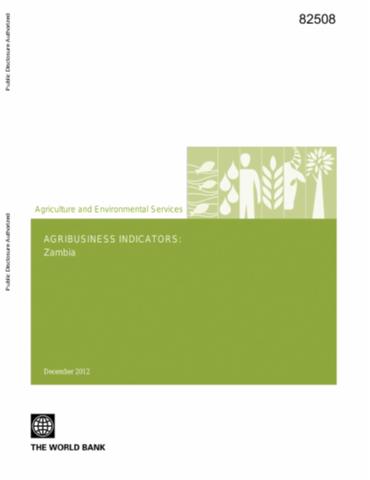Discusses two agricultural investments in Zambia. Both projects started as state-led, development-oriented initiatives in the 1970s and early 1980s, and were later privatised. This long implementation history provides an opportunity to assess the longer-term socio-economic outcomes of…
Agriculture and agribusiness play an important role in the Zambian economy, contributing around 20 percent of gross domestic product (GDP) in recent years and about 12 percent of national export earnings. Agriculture employs nearly 70 percent of the labor force and remains the main source of…
Agriculture and agribusiness play an important role in the Zambian economy, contributing around 20 percent of gross domestic product (GDP) in recent years and about 12 percent of national export earnings. Agriculture employs nearly 70 percent of the labor force and remains the main source of…
The increasing frequency of extreme climate events such as droughts and floods, as well as increasing temperatures and declining rainfall, are the expected future weather patterns of climate change hot spots such as Sub-Saharan Africa. Climate change and variability hot spot areas will be most…
Traditionally, the spread and extent of human settlement beyond the major riparian zones of Sub-Saharan Africa (SSA) and across many other arid regions of the world, has been determined by availability of groundwater supplies, accessed through hand-dug wells andsprings. In more recent times,…
The AgWater Solutions Project, carried out between 2009 and 2012, focused on resolving water issues faced by smallholder farmers. The project examined existing Agricultural Water Management (AWM) solutions, together with factors that influence their adoption and scaling up. The project aimed to…
This Working Paper summarizes research conducted as part of the AgWater Solutions Project in Zambia from 2009 to 2012. Approximately 48 million hectares (Mha) of land in Zambia are suitable for agricultural use. An estimated 67% of the Zambian labor force is employed in the agriculture sector.…
Media stories often speak of a future dominated by large-scale water wars. Rather less attention has been paid to the way water conflicts play out at local levels and form part of people's everyday lives. Based on case study studies from Vietnam, Bolivia and Zambia, this paper examines the…
The Agricultural Water Solutions Project aims to unlock the potential of smallholder farming by identifying, evaluating and recommending a variety of agricultural water management (AWM) solutions - including technologies as well as the necessary supporting policies, institutions, financing…
The AgWater Solutions Project aimed at designing agricultural water management (AWM) strategies for smallholder farmers in sub Saharan Africa and in India. The project was managed by the International Water Management Institute (IWMI) and operated jointly with the Food and Agriculture…





